The Christmas
Decameron
Project
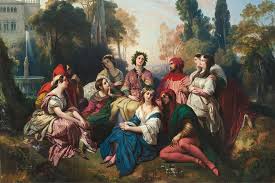
A Quarantine-Inspired Creative Writing
Collective
The challenge:
Write a short story, fable, or fairy tale, 1000-words or fewer, Christmas-themed!
I will start releasing the stories, one-a-day, from December 16th through Christmas
In 1353 Florentine Giovanni Boccaccio published The Decameron–a precursor to Geoffrey Chaucer’s Canterbury Tales. The Decameron is a collection of 100 tales: the premise of which is ten tellers telling ten tales each over ten days. Seven women and three men left the densely populated city for the hills above Florence to escape the Plague. The stories were a way to pass the time during a two week quarantine period. (They left one day a week for chores and one day for the Sabbath.) Each day a different pod-member chose the theme for the day, and everyone had to tell a story based on that theme.
Well, it’s DEC-ember, and we are still under the DEC-imating influence of our own version of The Plague, so why not create our own DEC-ameron. Christmas themed!
~ The STORIES ~
~ Christmas Day in the City ~
A Bird's Eye View
of the Year
Erica wanted to write a Christmas story about Rocky the Rockefeller Center owl,
but the tale went another way.
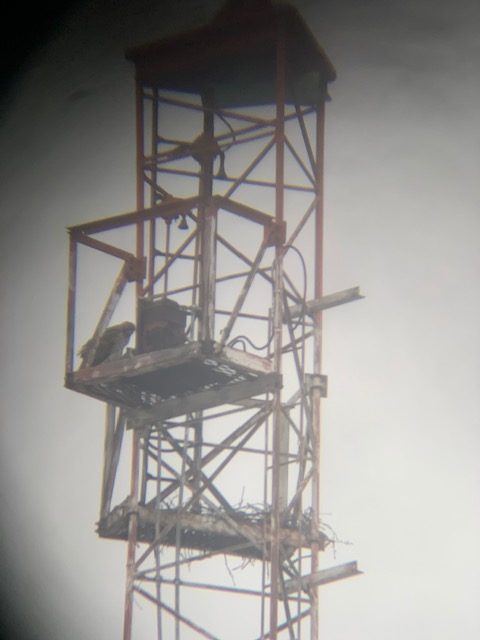
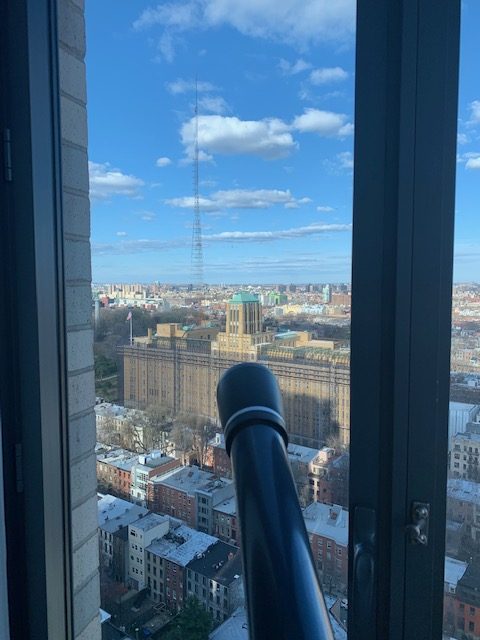
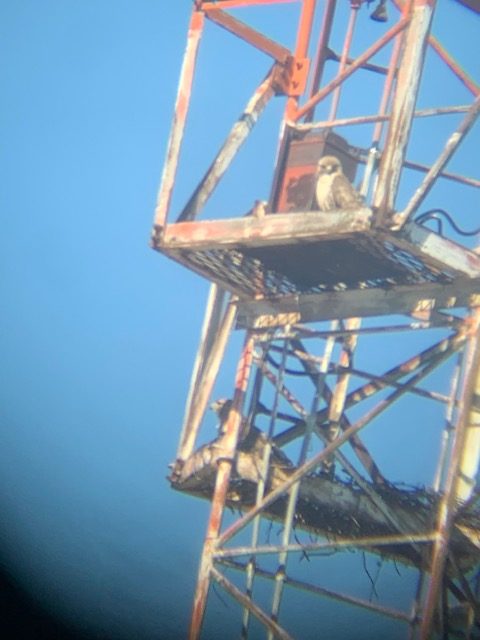
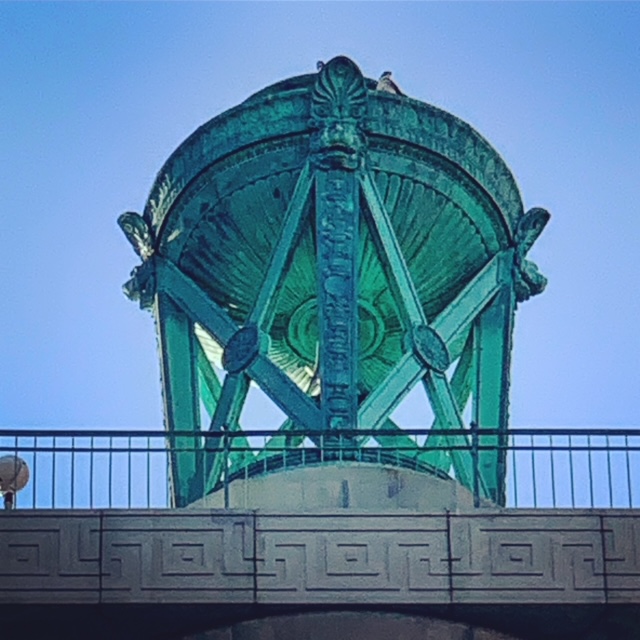
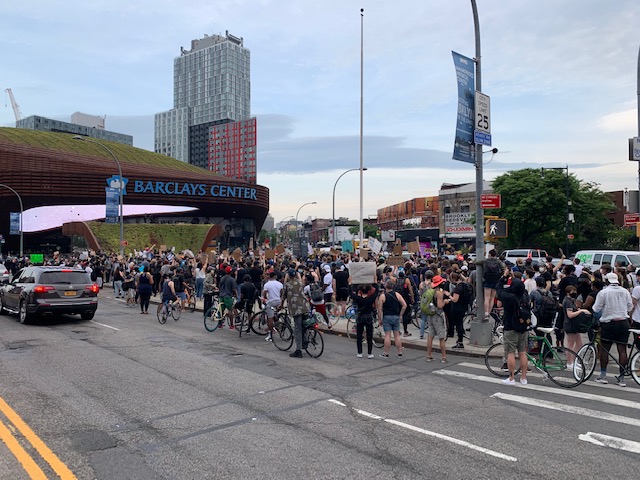
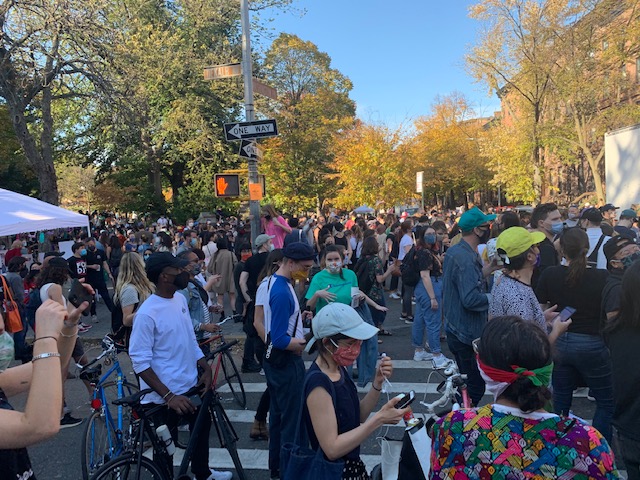
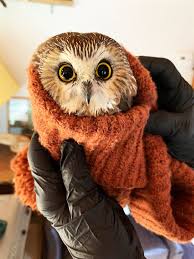
There are two hawks who live in Fort Greene Park, in Brooklyn. Their names are Mars and Nola Darling. They have several roosts, and can often be found perched on top of the bluish-green globe of the obelisk at the highest point of the park. From that far up they can see just about everything that happens in Fort Greene, and some things they saw this year really surprised them.
It started in late March, where they just got the feeling that they were being watched. They had started to build a nest high up in the radio tower on top of Brooklyn Tech, which was even higher than the obelisk, and a wonderful jumping off point to soar above the neighborhood. But it was strange. When they went for their daily soars around the open sky above the blocks of brownstones, they began to notice that the normally empty windows of the high rise apartment buildings had people in them. People who were looking out. And watching them.
As the earth started thawing and coming back to life, Mars and Nola Darling saw lots of people in the park. And every day, not just two days a week. The people seemed different. They weren’t rushing around like they usually did; they seemed slow, and sort of asleep. They saw rollerbladers, runners, people doing the stairs, people on bikes, and of course, lots and lots of dogs. More dogs than ever, it seemed. One day they even saw some people come into the park and lay right down on the grass and look at the sky. For hours.
Not only were the people of Fort Greene looking out their windows more, at the same time every night, they came out on their stoops, up on their roofs, or opened their windows and made the most terrific noise. It was unmelodious metal on metal, clapping and shouting. It sounded scary to the hawks at first, but they could sense that the people felt good when they were doing it.
As the air warmed and the park became green, more and more people came. And not just for a walk. They set up tables, chairs, blankets, giant colorful pillows, and they carried heavy bags and pulled wagons and coolers full of food they unpacked and shared. The groups weren’t as large as they had been in the past, but there were many, many more. At first the hawks were a little concerned about having more dogs and more people than ever in their park, but they grew accustomed to the company, and of course, they flew high above the fray.
It was a long summer with lots of sun and the quiet. The leaves lasted longer into fall than ever before. Then one sunny summer market day, when they were perched high atop the obelisk watching the people stand in line to buy their food, there was suddenly a huge eruption. Human voices, happy, joyous, shouting. Then car horns beeping. It went on and on. Mars and Nola Darling took a soar around the neighborhood and saw that people filled the street, and they were dancing. They had never seen anything like it before. Earlier that summer there had been people in the streets, but their movements were stiff and guarded and angry. Back then they carried signs and shouted. Now the people carried bottles and babies and they sang. It was the happiest day they had ever seen in Fort Greene. And the most crowded.
As the days grew shorter the people came to the park less. The usual dog walkers in the morning, the exercisers on the steps, the marketers on Saturday, but fewer and fewer people came and sat for hours. The energy in the air grew heavier, and Mars and Nola Darling wondered why the joyful dancing in the streets had stopped. Where they once lived above the human fray, simply observing and chronicling, now they started to worry. They wanted the people to be happy again.
All year long they had watched as the cars left the city for the greener mountains and woods, and from time to time they would follow them. That was another thing that was different. More people leaving. Maybe they were happier outside the city. Mars and Nola loved Brooklyn life, but they, too, had friends in the country woods. One chilly day they flew north to visit their wise old friend the owl. They talked about how people, the neighborhood, and the energy in the air wasn’t the same. How all summer long it was a different city, and how now the people had gone inside.
Well, as it should happen, there was a tiny owl who was listening to their conversation. This was the sweetest and smallest owl of the forest, but she was not meek. Oh no she had a sense of adventure. She wanted to go to New York City and see what it was like. She was tired of nothing but green. But she was too small to follow Mars and Nola home–and besides, they would surely see her, being hawks and all, and send her home to the woods. So, you know what she did? She stowed away inside a giant tree that was being cut down to be taken to New York City for Christmas. She had heard of owls doing that before. Her plan was to sleep until she got there and then when no one was looking, take off and fly around the city.
As you may know, it didn’t quite work out that way, and by the time she woke up she was stuck in the branches and the hands of a human were wrapped around her. She got lots of care and attention, but she never got to soar over the city. They sent her back to the country, safe, but disappointed. What she never knew was that even though she never got to see the city, she brought its people so much joy. They called her Rocky, and though she may never know it, lots of stories are being written about her adventures.
~ Night Nine ~
Christmas Eve in the City
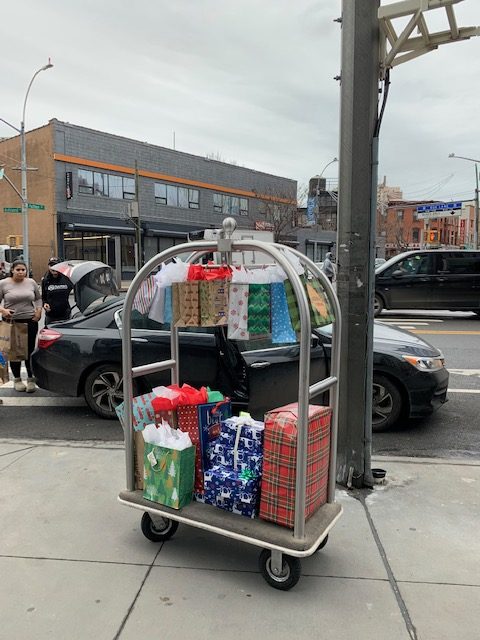
To the tune of Silver Bells
by Erica Cantley
City sidewalks
Empty sidewalks
There's no lines in the stores
What a good year for last minute presents
It is warm out
You go shopping
It is easy as pie
Only lines that you find are for food
Tourists long gone
Shoppers home bound
Waiting on that last box
And on every podcast you'll hear
What a year
But don't fear
Vaccines arrived just for Christmas
We're still here
Have good cheer
Soon it will be Christmas Day
~ Night Eight ~
The Day of Days
A Christmas Legend
by Jennifer Angelino Petro
Jennifer is a local transgender woman, mother of three, activist, writer, and musician. She loves Wodehouse, dark chocolate, and doing jigsaw puzzles.
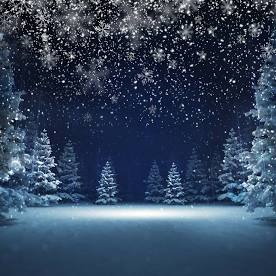
For miles they walked, taking turns carrying the child. They moved cautiously through the darkening woods, ached with fatigue. When their steps slowed to a halt, they couldn’t help it, they sat down right there in the middle of the wide path. The mother handed the child to the father so she could stretch out. The father held the child on his chest and joined her, lying on the cool, dusty earth. They closed their eyes. Sleep took them in its arms instantly, but the couple barely had time to breathe, before eyes appeared in the darkness, and twigs began to snap. The father sat up, roused his wife. And then, suddenly, silently—as silently as the flocks of stars moved into the night sky, animals stepped from the shadows. A mountain lion, a bear, a wolf, a deer with candles in his antlers, a heron, and finally, an owl—eyes round as the moon. They huddled there, quaking, turning every which way as one by one, the animals formed a circle around them. The father moved his hand to cover the child’s face, only to have the child brush it away, his eyes wide with glee as the animals gradually moved in closer.
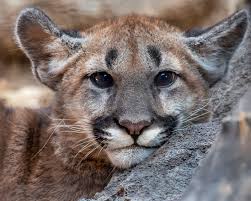



First to reach them was the mountain lion. She carried something in her mouth. It was a dead rabbit. She laid it at their feet and turned away, yellow eyes flashing, head bowed. The bear lumbered towards them next. In his mouth was a fish, its scales shining with rainbows. He laid it before the trembling couple, snorted, sniffled, and then padded back to his place in the circle. Then came the heron, looking for all intents and purposes, like a tall, skinny butler. He stepped his long, remarkable strides, and in his outstretched wings was held a bowl of pure, cold water. He offered it without spilling a drop, and then stepped back in a shimmer of gray. The deer came forward, hooves gently stirring the sand of the road. He knelt down on his front legs, bowed his head, offering the little family its candles. The mother understood, nodded to her husband, and took the child back in her arms. The father, hands trembling, took each lit candle from the antlers where the wax snapped and broke in snowy flakes. The father set the candles down next to his family, where they stood like little lighthouses. The child giggled and stretched out his hand and the deer inched a little closer and nuzzled the baby’s fingers. The child laughed a laugh that rang into the night, like a stream of light.
And so, one by one, the animals came bearing gifts of wild berries, salads of dandelion greens and edible flowers, and even freshly baked bread from—from—who, except the child, knew where. The wolf took his place beside the family and stood guard as the father got to his feet and made a fire. They cooked the fish, skinned and cooked the rabbit, and tentatively began to eat. And eat they did, their faces illumined with wonder, their tears shining in the moon light. The child suckled his mother, smiling at the animals out of the corner of his eyes.
After they had eaten and drank their fill, they laid back down on the path and sleep draped a drifting shawl over them like a peaceful sigh. The child however, sat up awake on his mother’s belly and looked around at the circle of animals standing around them, like sentinels in the night.
And then, the child looked up as the branch-laced sky began to rustle, and the branches began to rearrange themselves, bending down closer to the little family. The couple awoke and screamed and the child laughed, as the branches opened their arms in offering. The couple looked at each other not knowing what to do. Each of the animals in the circle took one step back. The child, still laughing, stretched out his hands and touched the tips of the branches. The branches seemed to nudge them, and then the family knew what the trees were saying. They carefully stood and stepped onto the waiting branches. And then, the branches slowly lifted them off the ground. The air caressing the little trinity as it rose, higher into the night sky, until, at last, the trees stopped, holding the family so close to the moon it seemed they could reach out and scoop a handful of light.
That night, they slept, all except the child, like a nest of fledglings in the gently swaying trees. The owl that had appeared in the circle rose to the tops of the branches and looked out, and into, the night, keeping watch over the little nest.
And then, for the third time, the family was awakened. This time they heard singing. It came from everywhere above them, below them, around them; lush and full, and yet soft as down. It was a song of crickets and of night birds; frogs, and rivers; the leaves, the grass, and far away fields. It was the song of rocks and stones; lilies and orange salamanders. It was the song of All and, wonder of wonders, it seemed to be coming from the child. As the mother and father listened, they felt him thrum with light. They could feel the song coursing through them and down into the earth holding the roots of their tree with all the tenacity of a mother swaddling her baby against a storm.
The child opened his arms, light and song pouring from his heart. As the child sang the planets sang, and the Milky Way opened her wide spirals, gathering them all in her star-fringed arms. The child laughed and laughed as he saw what his mother and father could not–the Creator of all holding them in his dark, cupped hands and in the very song itself, which came from himself in waves of what could only be described as love. He held every planet and star, the Milky Way and all of the other dancing galaxies. He held the earth, the trees and rivers; the animals and oceans; every town and village, each and every one of the hopes of humanity. It all unfolded in one elaborate tapestry of wonder and perfection. And the mother and father watched as the light from the child grew bright as the sun, luminous as the moon. They wondered what he was looking at as his eyes, radiant with laughter, seemed to see every note and every melody bending and turning like banners throughout the universe. The song rose from the child merging with the Creator’s, like a river into the sea. And that night, the night that changed everything, wasn’t a night at all. It was the day of days.
~ Night Seven ~
Winter Squash
by Claire Virginia Pitcairn
Between classes and her teaching job at the Rochester Museum and Science Center,
Claire has been spending time with her boyfriend, baking, knitting, crocheting,
and cross-stitching.
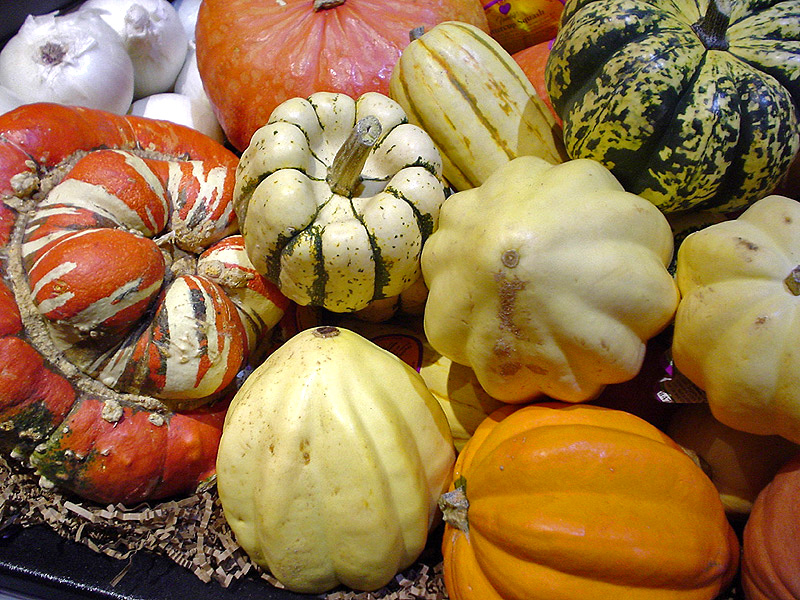
My love gets out of bed before me, like every other morning. I slink to his side of the bed and fold his pillow in half, his warmth and his smell still fresh. The electric kettle rumbles. The shower turns on, runs the short length of a dream’s performance, then turns off. Half-asleep, I call his name.
He sits in the angle of my gently bent knees and places a hand on my shoulder. My eyes still closed, he folds his other hand with mine. I sigh.
“You feel vulnerable?” he asks, though it’s not a question.
I press his hand to my lips and I nod. The kettle stops puffing. The room fan oscillates in its indifferent, predictable way.
I take a bolstering breath in, and manage weakly. “I had a nightmare.”
He sighs through his nose with helpless recognition: there is only one nightmare. The bed bounces gently as he nods his head. “Yeah.”
Stillness. He rubs my shoulder, then pulls back with sudden self-awareness. “Is this okay?”
I nod again and he places his hand back, starting slow circles again. “It’s not your fault.” “I know,” I reply, a little too quickly and a little too mechanically. I shut my eyes a little tighter, and force myself to take a deep breath. He takes one with me.
“You’re so strong,” he continues, thinking I want to hear it. “I’m so proud of you.” “Thank you,” I say, knowing he wants to hear it. I wiggle onto my back and he quirks a sideways, sympathetic smile. “It’s getting-up time,” I tell him, and prop myself onto one elbow. He stands, still holding my hands, and lifts me out of bed and into a hug. I nestle deep into his shoulder-length hair and breathe him in–thinking how he hasn’t gotten a haircut since we met, the way his nose scrunches up with joy when I call him handsome, the one crooked tooth that turns inward in his smile. I line my fingers along the notches of his spine and think: I’m here. I’m here. I’m not there; I’m here. I drum my fingers along the ridges of his back and I think: It’s December. I remember where I was a year ago and remind myself consciously, begrudgingly, that I’m not there. I’m here.
I lean back and squeeze his shoulders, upper arms, elbows, as if to remind myself he’s real. He holds me by my waist and reads my face. My mouth tastes like cranberries– bitter and dry and redolent of sleep–and selfishly I hope he doesn’t kiss me. I’m foul. My flyaways hover over my shoulder like stringy ghosts and my teeth are sore from grinding them in my sleep and my mouth is dry from waking up in sweats. He presses the tip of his nose to mine and closes his eyes meditatively. I try to swallow my tongue. His cheeks hollow when he puts his lips out. I meet him in the middle, giving him a kiss, and he doesn’t mind at all. He lingers a moment, and pulls away. “What do you want for breakfast?”
There’s a winter squash sitting on the counter; a green, lumpy, ancient thing that has been perched in the corner like a sentinel. “We could have the green one,” I suggest. “With onion and garlic, and maybe some leaves? And eggs.”
“It’s blue,” he corrects, before nodding, and there’s relief and normalcy in that he’s not going along with everything I say. “And yeah, that’s a great idea.”
I set out the cutting board and take the kitchen knife up like a broadsword and lay the squash down. I line the knife up with the vine, and lean all my weight into it. The knife sinks in a fraction of the way and sticks. I lean my weight in again. I press on the handle and spine of the knife and wiggle it in a little further, before dropping the task with a huff. “It’s stuck,” I tell him. “The skin’s too thick. I can’t get through.”
He brushes my hand aside, gently and wordlessly. With pursed lips and a forceful exhale he finishes the cut, and does the same to the other side. He halves it, and hands them to me with a kiss. I clean them while he slices up the kale and onion.
I scrape the spoon along the walls and pull the stringed-together seeds gently into the trash, as if it would hurt the squash otherwise. I feel like a villain. I remind myself that this squash was made to be used. I carve out its insides and place them in the trash. The word “clean” dances around my head like a mocking little jester. I think: it is work to cast the unwanted aside. This repeats to the rhythm of my scraping until I hand the halves back to him, violated and hollow. It’s December, and I’m here. Not there; I’m here. It’s been a year. I stretch my shoulders and feel the empty space in my stomach. He muscles through the now cleaned halves and dices it into little cubes. The thick skin, the tough flesh, the stringy guts that I had missed, will all soften like judgement under drink, then be consumed. It’s December. It’s been a year.
My love hums, visibly proud of our work. “This is good.” He announces. “Nourishing.” He pokes my tummy with one finger. “This will give you your vitamins.”
Nourishing. I nod. The squash was made to be used. He sees no destruction in the creation of a meal. He sees no fault in the thick skin, no loss in the cleaned core. He closes the oven door and sets an hour timer. The skin will be coarse and chewable. The soft flesh will be warm and filling and rich with nutrients. He sees the work worth doing, and he doesn’t mind at all.
~ Night Six ~
Locked...A Holiday Tale
by Joan Cargill
Joan is a proud mom of an 18 year old who survived his first semester on campus in COVID. She is celebrating 15 plus years curating and producing luxury and celebrity images while writing quietly on the side.
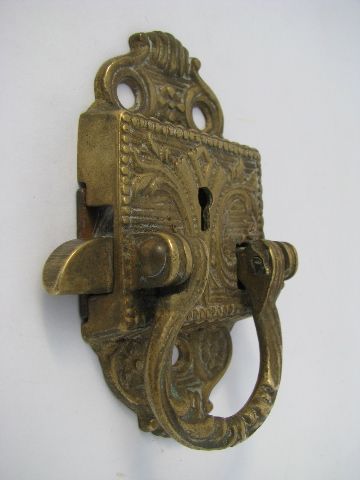
Muffled children’s voices singing could be heard far away, “…and a partridge in a pear tree….”
“There. Just beautiful,” says Shennah.
Glittering lights dance about her face as she marvels at her creation. Candles of all sizes flickering on the window sills fill her pitch black room with much needed light. Although it looks as if it’s one spark away from burning the whole house down. “Who cares about the holiday anyway?” Floating metal and glass find their proper places with the swing and sway of Shennah’s hands furiously orchestrating the dance. The final pieces of metal and glass fall into place. But could you touch it? Absolutely not.
Satisfied Shennah echoes “…and a partridge in a pear treeeeee!” A Christmas tree made of metal and glass hovers in the middle of the room like an angel.
“Silbert look…”
A deep crumbly voice from out of the dark utters, “Looks beautiful, Miss. But I would love some cooked partridge at the moment.”
“Silbert all you think about is your belly. I’m creating our gift.” Shennah struggles to keep the floating structure together. For a moment the lights highlight the locks on Shennah’s door all on the wrong side. Obviously to keep her locked in.
Breathless she struggles to say, “Silbert, five more minutes and it’s a record.”
Shennah rolls her eyes and does a jig while keeping her eyes on all of the locks on the door. She is getting so close to being able to open all of them.
“Shennah!” a voice yells! Then someone begins banging the door. Distracted, her structure crashes to the floor.
“Silbert, stay there!” whispers Shennah as she dashes under the covers.
“Open this door. What in heaven’s name was that noise?” No response. “Right. That’s right. You can’t can you? Ohhhh dear.”
Nervously ringing her hands Cathrine, the Mistress of Mischief Prevention, tries to find the keys somewhere on her body.
Frustrated she resorts to low form and pushes her head through the door nose first looking into the room. Her glasses fall to the floor.
“Now I can’t see!” Her head disappears. Back on the other side we hear the keys opening the locks one at a time. The door creaks open and Cathrine falls to her knees feeling for her glasses which she finally finds.
“Show yourself young lady. I can smell you from here.”
Shennah with doe eyes brings the covers from over head trying her best to look like an angel. Metal and glass are everywhere. Cathrine sits on an invisible chair near the edge of the canopy bed. Turning up the lights with her hands reveals gorgeous cushions surrounding Shennah. Plates of food on the dresser. Shards of sparkling glass and metal on the floor.
“It’s your fifth holiday with us.”
Shennah sheepishly sits up.
“I wish you could join the girls tonight. We’re wishing Queen Mother a safe journey. She’s visiting our benefactor tonight”.
“You mean at the school?” Shennah starts to run her finger along her chin.
“No. His home. Queen Mother demands perfect behaviour before a girl can be sent there. Santa is watching, young lady. He knows–“
“Who is naughty or nice,” Shennah interrupts.
“Yes, no matter who she is.”
“I apologized. No fair being locked up for so many weeks. Promised. No fire. No glass. No metal.”
Looking around the room Cathrine says, “And here we are. We’ll see.”
“About what?” asks Shennah. Silence. “School? No one can adopt me, so it has to be school. Am I supposed to be here forevah?”
“Forever. Queen Mother would never allow it anyway.” Cathrine never takes her eyes off Shennah as she pulls out a gorgeous red dress with white lace trim from her skirt. In seconds Shennah is modelling her dress while trying to seem slightly bored with it all. Her thick curly shoulder length hair hanging about her brown face looking like it has gone too long without hands that knew how to braid it.
A mothers’ hand.
Cathrine digs again into her skirt and pulls out a velvet black box.
“Another gift? Why is it making noise?” Shennah unwraps what feels like one million pieces of paper. She opens the lid revealing an amuletti on a necklace. Must have been hundreds of years old. Shennah was in awe.
“Your mother’s. Now it’s yours. It’s time.” Holding back a tear Cathrine starts humming, “Hark the herald angels sing. Glory to the newborn King.”
Walking behind Shennah Cathrine turns her to face the mirror which had missing pieces of glasses probably used for her project.
“Can I speak Miss,” grumbles Silbert.
“Yes Silbert. You know it is only because of this child that I haven’t killed you.”
“Just wanted to say it’s beautiful.”
Turning Shennah to face her, Catherine says, “Merry Christmas my dear Shennah.”
Then the Mistress of Mischief Prevention takes out some horrible looking meat in a bag and slips it under the bed. “For you Silbert.”
“Thank you, Miss.”
Cathrine pulls herself together and walks to the door. Looking back for the last time with her head down.
“Are you coming or not? I hate treating my princess like this.” Cathrine slowly courtesies. “You are rough, but it’s time we start behaving like we all know who you are. Merry Christmas Princess Shennah!” Cathrine turns to leave the room.
“Wait for me please! Merry Christmas Miss Cathrine. Thank you.”
With that Shennah grabs Miss Cathrine’s hand and the candles come back to life flickering as they leave the room. We follow them out the door with pieces of metal and glass following behind like a shooting star.
~ Night Five ~
The Chinook
by Lori Odhner
Lori writes daily messages called
Marriage Moats, which are intended to provide a ring of protection around our relationships.

Once upon a time there was a man who lived his whole life in Tahiti. He enjoyed the weather and didn’t own anything warmer than a flannel shirt. One day he received a phone call saying his aunt had died and left him a wheat farm in Nebraska. So he packed up his few things and boarded a plane for America. The crop was growing well. He kept an eye on his neighbors and when they watered, he watered. When they weeded, he weeded. People at the General Store asked how he was getting on and he always smiled and said “Just fine”. By late summer the wheat was ripe and he harvested a good crop. He liked farming.

By November things were getting colder. He wore three t-shirts, but had no idea about storm windows and furnaces. He couldn’t figure out how other folks were staying warm but he wasn’t about to ask. The fields looked pretty bleak, so he watered more at night, until the hoses froze. Leaves were covering the fields so he tried to sweep them. Then just when things seemed awful white stuff started falling from the sky, suffocating the frozen wheat stalks. He did his best to shovel it but the wind kept scattering it. He was really cold at night and the potatoes and carrots in the root cellar were running out. Neighbors wondered why he never wore a coat, but didn’t want to be nosy. By February everything seemed hopeless. He had only been on the farm a few months but he had killed it. Cold, exhausted and ashamed he put up a For Sale sign and went back to Tahiti. The End.
What is so sad about that story is that he would have really loved the coming of spring. Each tiny sprout, now silent under the snow, was about to yawn and push its way into the light. Miracles were just around the frosty corner, waiting to waft in on the first Chinook. New life lay poised within eggs, dens and the tips of cherry trees. His farm wasn’t dead. It was only sleeping.
How often do we look at our efforts and pronounce them lifeless? We can all splash in the first rains of April, and bury our face in a wave of daffodils, but do we respect the seasons that precede and feed it? Spring is not an entity unto itself. It is part of a cycle that includes and depends on hibernation, fallow time and migration. The wonder of geese coming back implies that they left in the first place. To celebrate the peeping dogwood blossoms you have to have seen stark branches.


The Lord came into a world that was as bitter as a Nebraska winter, as austere as a frozen pond. But that backdrop of desperation doesn’t diminish the phenomenon, it intensifies it. The value of a quilt goes up in proportion as the temperature goes down. Our appreciation of our spouse is moderate in good times, inestimable in troubled ones.
To celebrate the Lord’s coming in your very bones is to have seen the starkness of your own soul, to shudder at the chill of your own selfishness, to hear the faint honking of life returning. It is in the wake of that cavernous void that the angels sang. To a world perched precariously on the borders of death, came the first heavenly Chinook, a message not yet cooled from its source in the Sun of God.
~ Night Four ~
We Three Trees
by Anonymous
The author grew up in a home filled with alcohol and love, and carries on that tradition with their own family to this day.
Christmas 1979
I lay on the couch in the living room watching TV. I didn’t really like the program but didn’t dislike it enough to get up off the couch, walk across the room, and change the channel.
Mom called from the kitchen, “Shay. Can you come in here? I need you to call your father. He should have been home by now. He’ll want to take a shower before church.” Dad was working a half day at the plastic packaging plant. After work he was going to buy a tree and do some last-minute Christmas shopping at Rennigers drug store. Rennigers was right across the street from The Greenville Tavern.
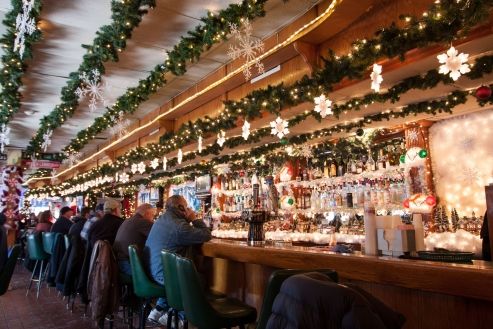
My mom never called The Greenville Tavern herself unless it was an absolute emergency. I knew the number by heart. I dialed the number on the rotary wall phone in the kitchen and played with the cord. The cord was long enough to stretch into the pantry for when I wanted to have a private conversation with the boy I met at the roller rink.
When the bartender answered, I asked to speak to my dad. l knew that there were two ways the call could go from there: either the bartender would immediately say that dad wasn’t there, or he’d make a production of calling his name, then come back on the line and say that dad wasn’t there. In both cases dad was most likely there. Dad never took my calls, but he always at least took them as a signal that it was time to finish his drink, settle his tab, and come home.
Ten minutes after the call, dad pulled into the driveway. Mom was at the kitchen window doing dishes; she saw the headlights and sighed heavily through her nose. I watched dad open the kitchen door and stomp the snow off his boots. The smell of gin, beer, and cigarettes followed him in. “Robert. Where is the tree?” mom asked.
“What?!” Dad looked back at the car. “It must have blown off while I was driving! Dangnabbit! That’s the last time I let the kid at the lot tie it on. I’ll go get another after church. I need to shower.” With that, he poured himself a glass of Gordon’s gin over ice, added two olives, and headed upstairs with the drink while softly whistling “We Three Kings”.
Mom wiped down the kitchen counters, took off her apron, and headed upstairs to get ready. I followed. I put on a green dress, curled my hair, and sprayed on some Charlie. It was a scent dad had given to me last Christmas. It made me feel grown up. I was glad Rennigers had a perfume counter.
When we returned from church, Mom put The Messiah on the record player. We would play my favorite Burl Ives record later, but for now Mom got to pick the music. She made herself a drink and started cooking.
“I’m going to go buy another tree and I need cigarettes. I’ll be back in 20 minutes,” Dad said as he walked out the kitchen door.
I had expected to be asked to make another call to the Greenville Tavern but, an hour later mom said, “Get in the car. We’re going to get your father.”
As we pulled into the parking lot, we both saw that there was no tree on the roof of dad’s car. Mom sighed. “Go in and get him.” This was bad. It rarely came to having to physically retrieve dad from the bar.
l walked into The Greenville Tavern. I loved this place and its long bar lined with stools, men in plaid jackets hunched over their mugs of beer. The sound of laughter and the music from the juke box, the saw dust on the wood floor, and the light fixtures made from old wagon wheels. And there was dad sitting in his spot at the end of the bar with a fresh pack of cigarettes lying next to his tall glass of Gordon’s gin. I walked over and he was happy to see me. ‘Hi sweets,” he said. His speech was slightly slurred. “Hey guys. This is my daughter. Isn’t she beautiful?”
“Mom wants you to come home. It’s almost time for dinner.”
“That it is. Goodnight everyone and Merry Christmas!” Dad flipped some bills on the bar and stood up. He held on to the side of the bar for balance as he put on his coat. Dad’s goodbye was met with a chorus of “Merry Christmas Robbie!” from the other men at the bar. Dad was only ever called “Dad” or “Robert” at home, but at The Greenville Tavern everyone called him “Robbie”.
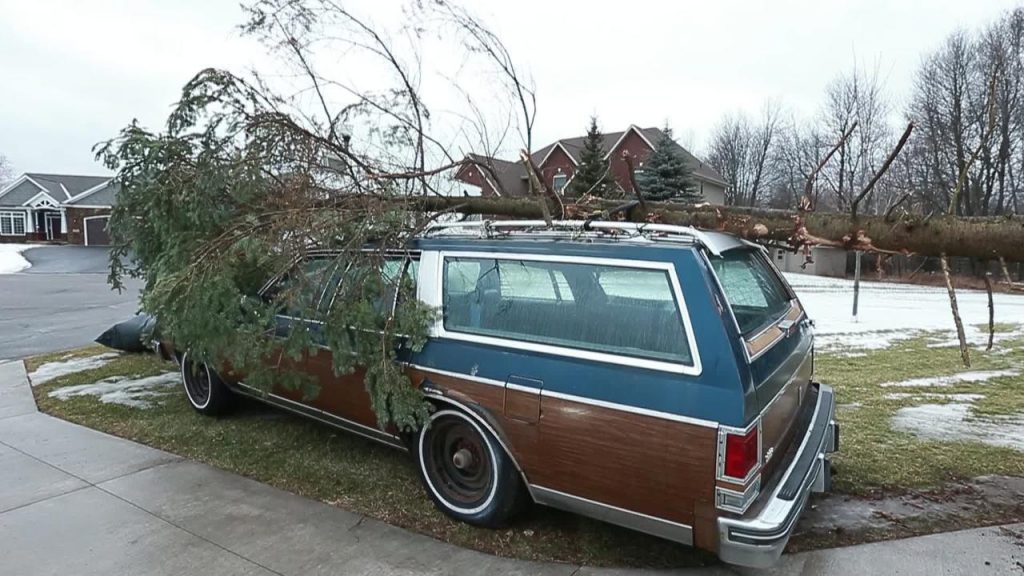
When we got outside, Mom was standing by his car. “Robert. Where is the tree?”
“What? Oh no! I tied it to the roof myself. It was there when I went inside. I only stopped in to buy a pack of cigarettes. I was only inside for a minute. Some jerk must have swiped it off my roof! How’s that for a Merry Christmas!? I’ll go back and buy another one but there wasn’t much inventory left on the lot.”
“You will not go buy another one. We are all going home right now. Shay, get in the car.”
Back in the warm house more gin was poured, dinner was eaten, Burl Ives was played, songs were sung, stockings were hung, but there was a gaping hole in the middle of the living room where the Christmas tree should have been.
After dinner mom made a telephone call to her girlfriend while she did the dishes. “Oh Thelma. We don’t have a tree. Robert bought two. One blew off the roof of his car on the way home and the other was stolen off of his car when he was at the Greenville Tavern. I suppose we will just skip the tree this year. There are other things that are more important. We both have jobs and so much to be thankful for. What does a tree matter in the grand scheme of things?” The conversation continued for a while, and Mom only stretched the cord into the pantry for a short part of the call.
By the time I went to bed, Mom was still a bit sad that there was no tree but it wasn’t a tragedy. She said that we might be able to find a tree at a discounted price the day after Christmas, and we could still decorate it and have it up on New Years Day. Dad wanted to go out to buy a third tree but mom said we couldn’t afford it and he was in no shape to drive.
I went to bed thinking mostly about the boy from the roller rink and whether I would get some new clothes for Christmas. I hoped Santa would bring me a Strawberry Lip Smacker. Maybe the boy from the roller rink would like that too.
In the morning, I woke to the smell of bacon cooking. I walked down the stairs and saw a tree set up in the middle of the living room! It was the saddest, most Charlie-Brown, Dr. Seuss looking tree I had ever seen. It was bent at a weird angle, there was a gaping hole in the middle where you could see 6 inches of bare trunk, the branches stuck out at all different angles and lengths. Yet, there it was, gloriously decorated with lights and ornaments and draped with carefully placed tinsel. Stacks of presents were stuffed below its sparse branches.
“Mom! We have a tree!” I shouted.
“Yes, we do. Thelma and Ernie brought it over late last night.” Mom looked weary but her hair was done and she was in a good mood. She gave me a hug. She was wearing Nuit de Noel, a special perfume that she only wore at Christmas. “Your father and I stayed up late with them getting it all decorated. Well, at least the three of us stayed up and decorated. Your father didn’t last very long. He passed out in his easy chair.” I knew that Mom had probably stayed up all night to make sure that this Christmas would be a good one. Mom continued, “It’s the craziest looking tree we’ve ever had but it‘s perfect. We will look back and laugh and always remember the Christmas when we had three trees!”
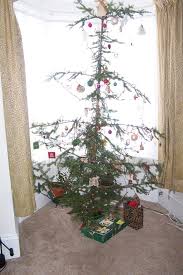
~ Night Three ~
Little Angel's
Christmas Wish
By Brenda Rydstrom
Brenda once taught Miss Erica Art
Also tutored in Comp for a start
Doesn’t write very hard
Often gardens the yard
Then paints flowers
and people for hours
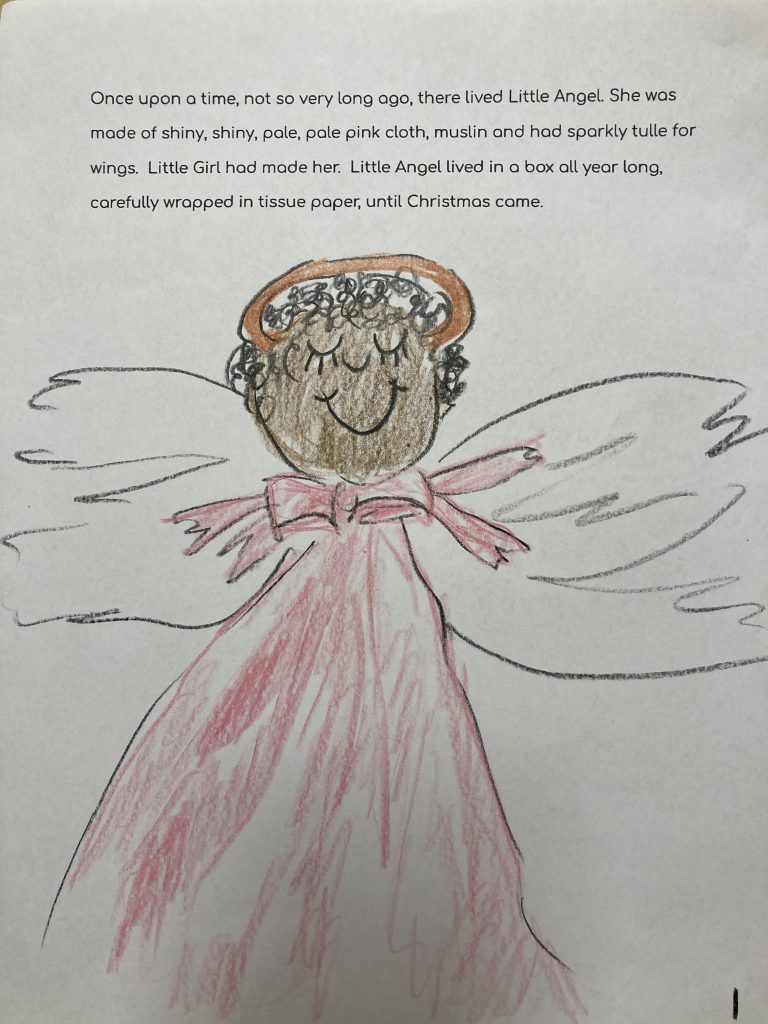
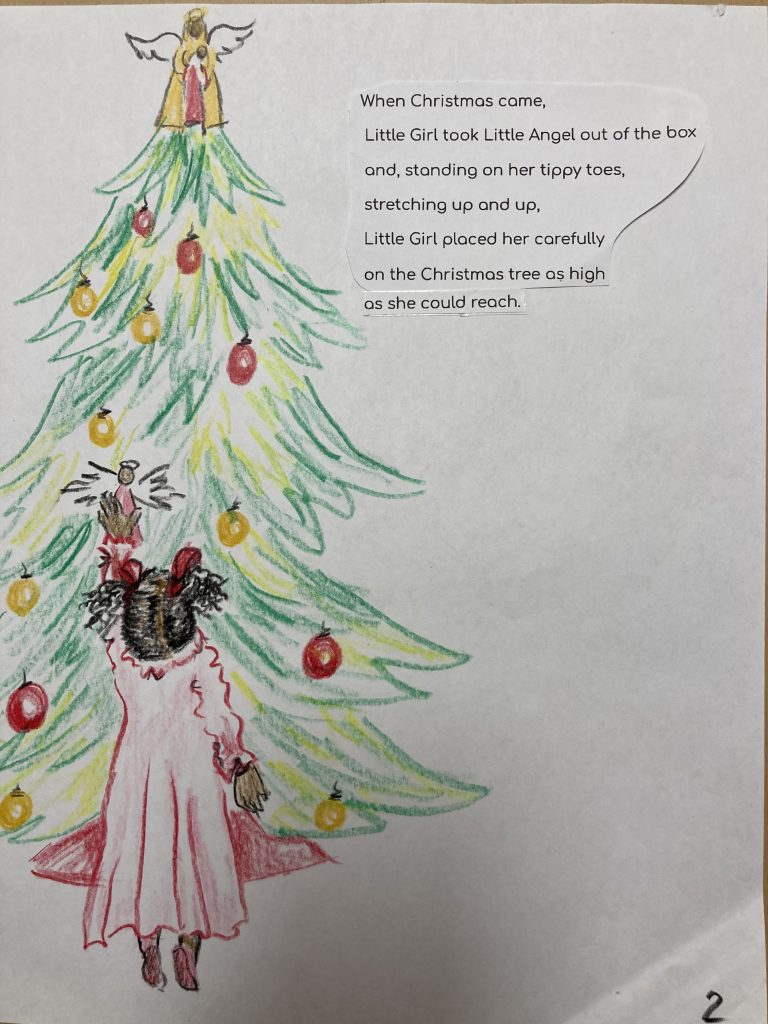
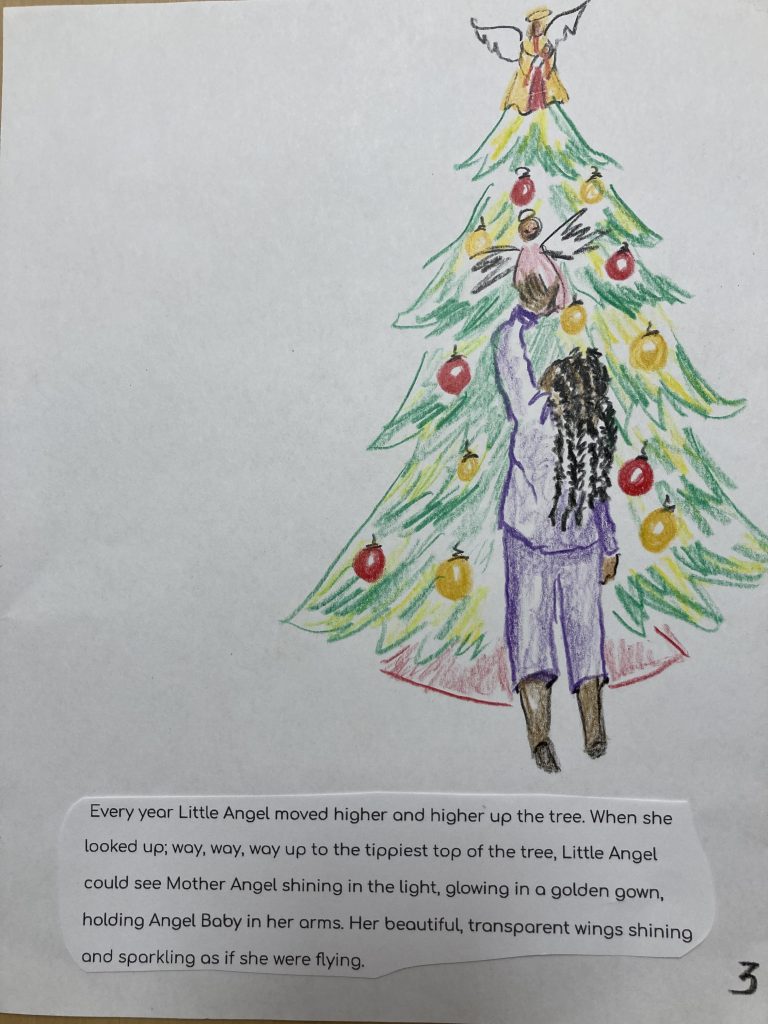
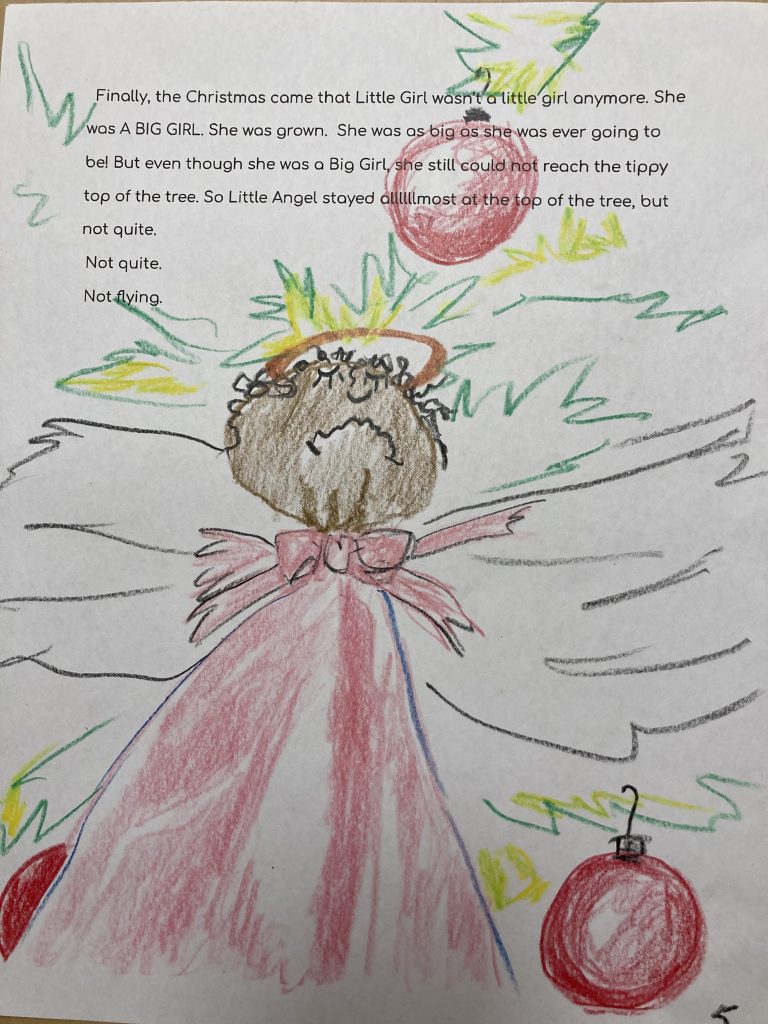
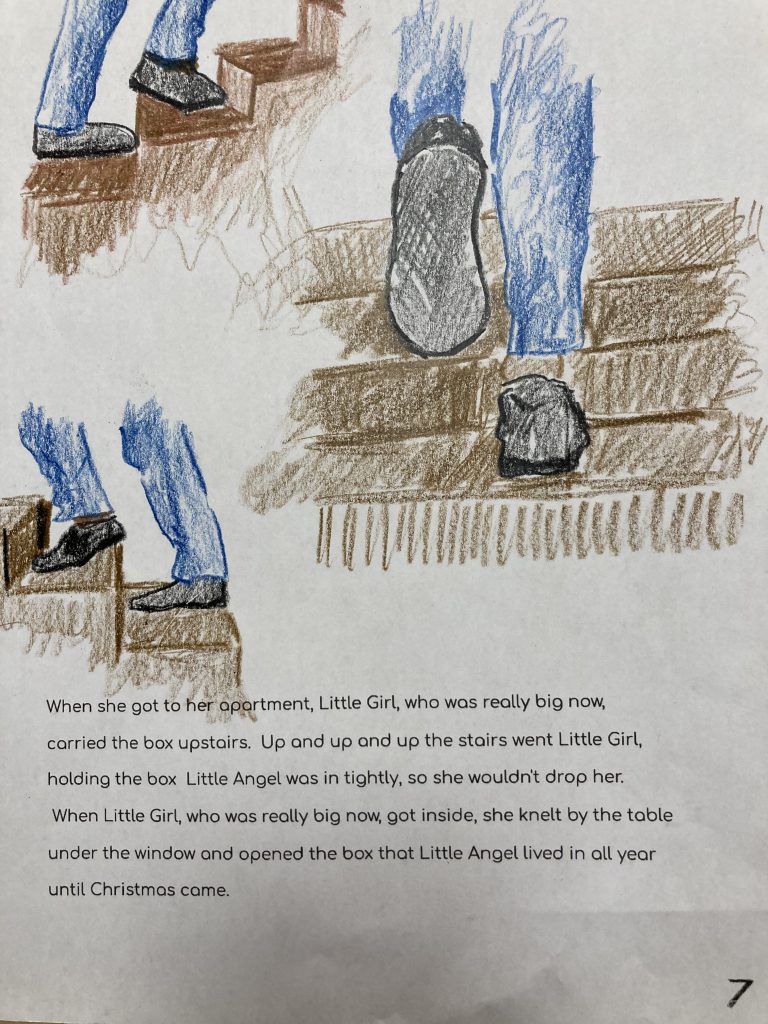
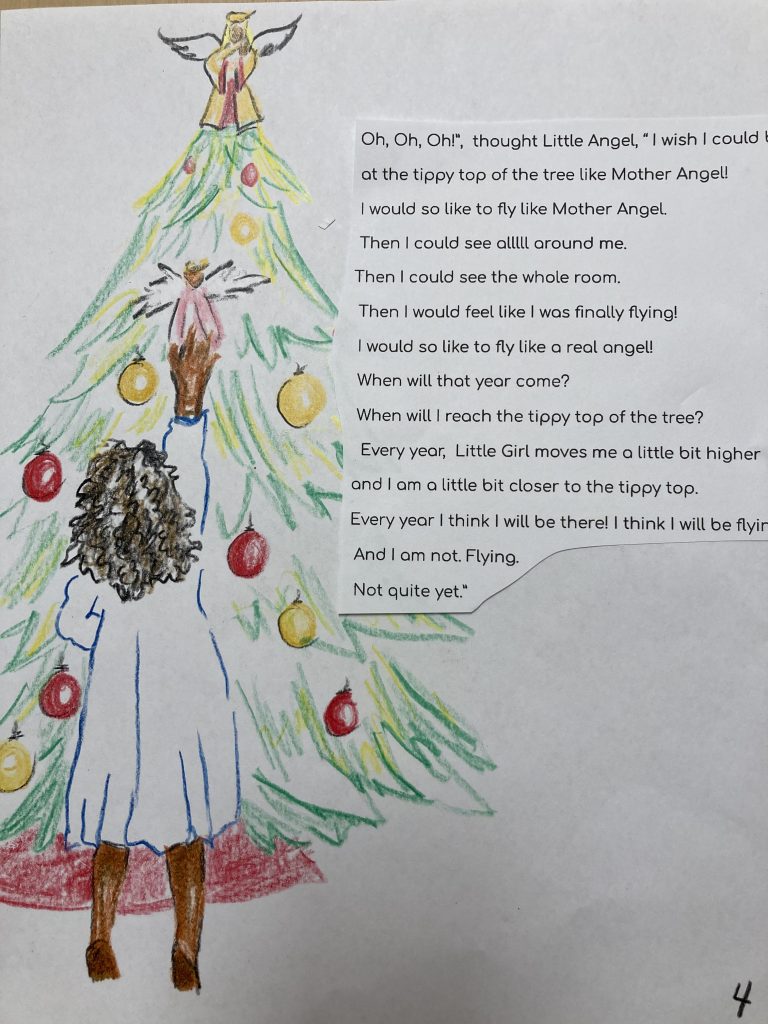
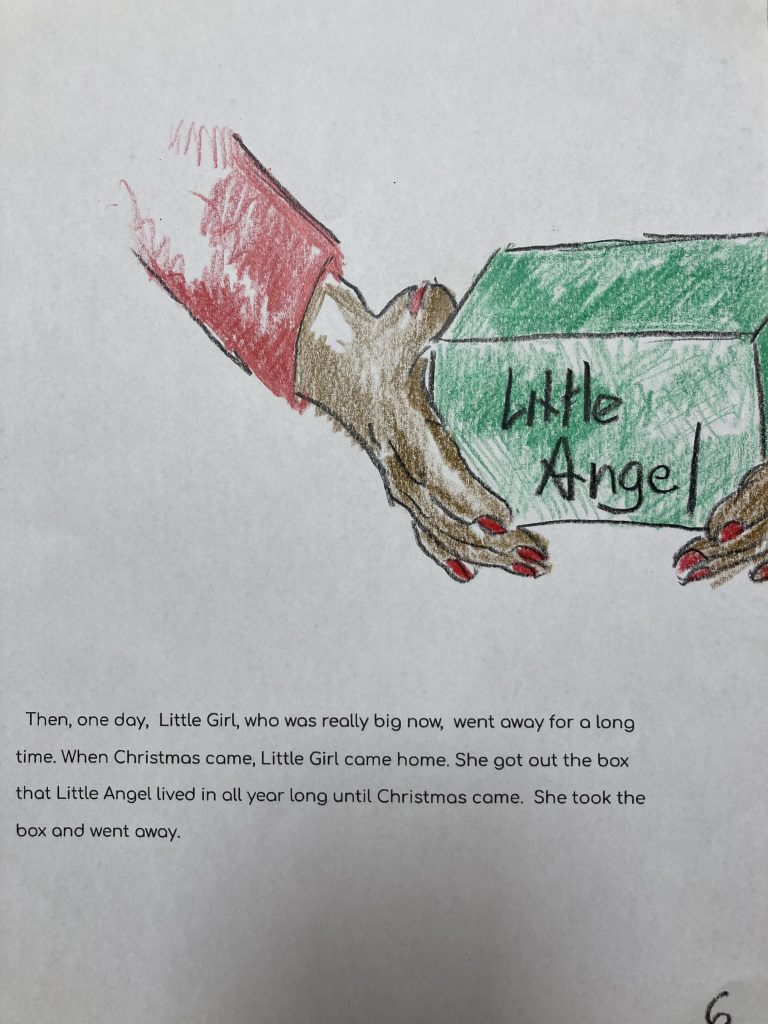
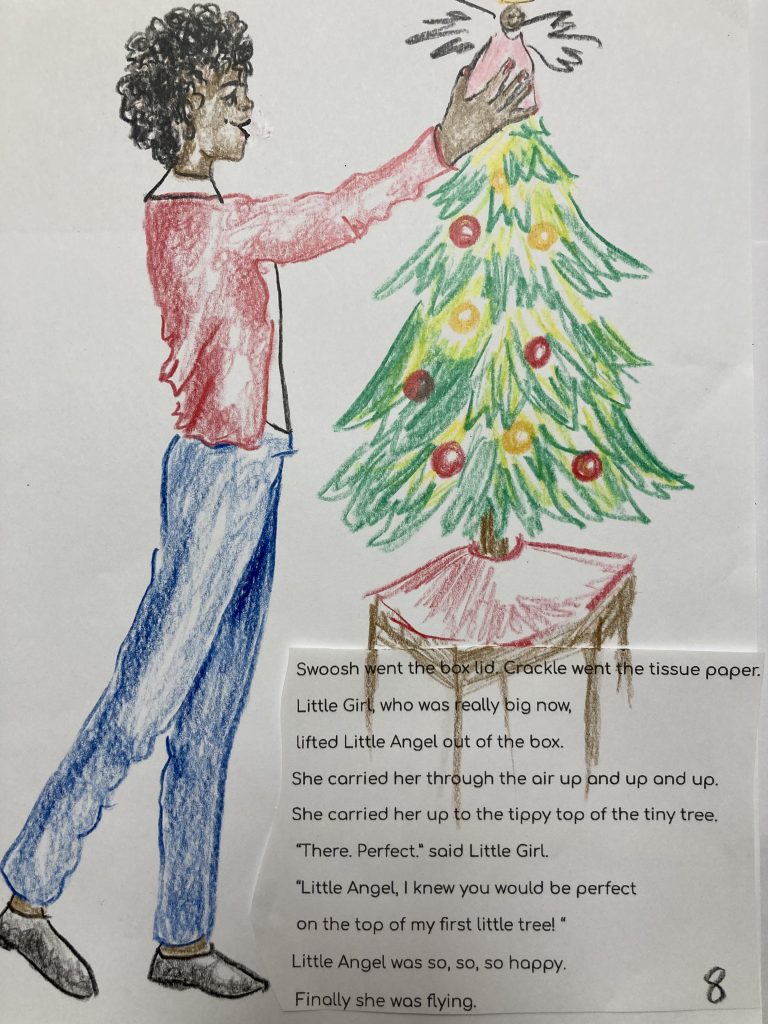
~ Night Two ~
A Viery,
Scerry Xmas
by Naomi Pitcairn
Naomi Pitcairn is obsessed with wildfire. She also does disruptive, political art and writes.
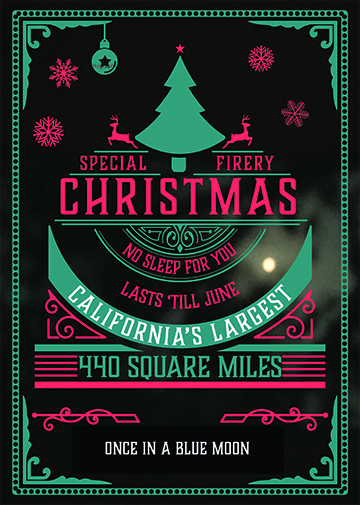
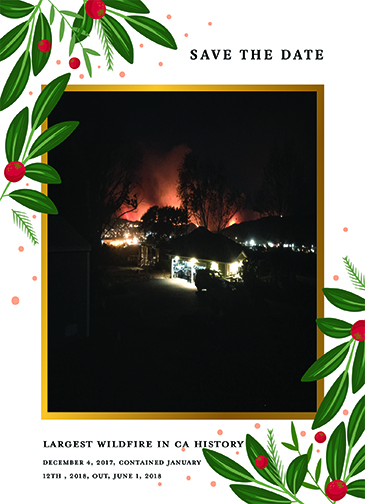
Some things only happen once in a blue moon. There was one that night. It had been in the news something about how many full moons there are in a season. She had been hoping for the color blue. Before getting into the shower she looked up through the skylight. It was very bright, if not blue. The skylight blurred it but she took a photo anyway, there was something eerie about it that the photo also seemed to capture. Into the shower and out hearing a helicopter overhead. The wind outside had the trees scratching at the windows like they were trying to get in. Why was there a helicopter in the air now?
She dried off and went outside to see if something was going on and there it was. Across the parched, Arundo-choked basin they called a river was the reason. Fire. On the hill across the dry bed. Flames shooting up hundreds of feet. The fire had roared up as the sun came down, lighting the sky. She ran to load the car with whatever she could think of, herding her irritated animals inside as the wind blew down the valley. The next time she had a moment to look, maybe 10 or 15 minutes later, the entire horizon was in flames. Miles and miles of skyline. Then poof, the power went off and the twinkling lights of the town across the river went black. The only light left was the fire.
She went next door to warn the young man who had been staying in her cottage. “Jason, we have a problem,” she said cautiously.
“I don’t want to hear it!” he yelled. Jason had “issues” she’d learned.
“I’m sorry you feel that way but there’s a fire on the hill across the river and you may have to evacuate whether you want or not.” Jason went outside, looked at the fire and said “I can’t deal with this.”
The antennas her cell ran on were apparently on batteries because she still had bars. There was an array of all kinds of antennas on her mountain, part of a state-long relay. She wondered if service would last. Information broke down. The county had no television stations or news copters like LA or Santa Barbara. The lone helicopter was gone and no images came in from across the river leaving things to the imagination. Every fifteen minutes she would check the window, then her phone, then the wind direction.
Hopefully it would be out tomorrow. But that didn’t seem that realistic, did it? The fire was growing, not shrinking and the wind was rattling things on her roof all night long like someone was walking up there. She called a few people and a few people called her. To her friends and family back East, she acted confident and assured. With her local friends, she was more honest and they compared stories and levels of how freaked-out they were. If the fire got in the river, the river would burn. There wasn’t any water. Last June a river fire had sent black flakes floating lazily onto her dry, yellow lawn, tangerine orange in the smoke-blocked sun like someone had clicked “inverse” in Photoshop and now snow was black and the sky was apricot. Hot embers had jumped the bridge though, up the river to where she and Jason could watch the planes swooping down and dropping their load with precision accuracy. The vermilion Phoscheck landed as gracefully as a cloud of butterflies. The June fire, that had been so epic at the time, seemed like nothing now. Not even a square mile. East coast girl.
The fire didn’t slack but the electricity came back up so she turned on reruns of Law and Order. The DUNK DUNK sound at the beginning would forever be a Pavlovian reminder of that December. The show went on and on. The actors must have spent their entire lives on that set, frowning at the way women were treated. Walking down the streets of NY with cameras in their faces. Dust and smoke came down instead of snow. Everyone’s eyes were red and local Marys and Josephs had blown over in the wind. Shrubs twisted at their bases and leaves tore from the trees in the relentless wind. She ordered a firefighting book online and found a site where you could watch the fire borders creep across maps of the local geography. She posted a blurry cell phone photo on Twitter, the Washington Post asked for permission to use it. It was a bad photo, blurry, but the epic-ness of the horizon, burning as far as the eye could see, got it in the paper. It was hard to get excited about stuff like that while you waited to maybe die though.
The fire wasn’t bright in the daytime. Instead of an orange, glowing cloud, the smoke took on a not-unpleasant peachy-brown. It blew west hard, pushing the head of the fire towards other people’s towns and cities, while the tail crawled slowly but relentlessly against the wind, in long, thin strips that looked like torn paper in the opposite direction. Where were the resources? Only a couple fire trucks whose lights you could see at night blinking red beneath the cloud. Another fire broke out to the East and was blowing in her direction, cutting off a freeway, but she couldn’t see anything because the mountain blocked that view. Escape routes got more limited. People wore masks like it was Covid. Birds landed on her lawn looking confused and lost. Jason came in from running errands furious that the store had been playing Xmas carols. His beautiful curls bobbled with foolish rage.
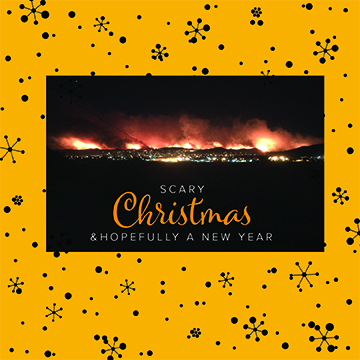
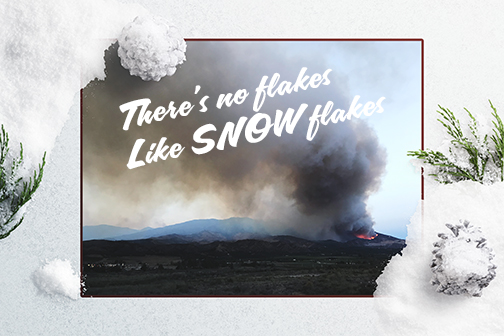

A fireman died fighting the fire and the news showed his coffin heading back to his widow and children. Nobody said exactly how he died. Again, it was left to the imagination. The helicopter pilots that fueled up at the local diner while their machines fueled next door at the airport were more subdued than ever. On TV, the streets were lined with mourners, saluting the hearse all the way to San Diego until she really really wished they would get back to the fire because after howevermany days it wasn’t out yet. Of course days would turn to months but that wasn’t something you wanted to dwell on. The general body feeling was a like doing cocaine for 11 days straight with no sleep, something she had never experienced but felt she could imagine now. It was impossible to concentrate on anything but the firefighting textbook (which luckily had come the day after she ordered it while the highway was still open). The book was full of fascinating bad news about the structure of her home.
Christmas Day came plunk in the middle of it all. The actual day was vague and hard to remember later. All anybody wanted for Christmas was for it to stop. Her ancestors had, no doubt, arranged greenery and lights as a promise of longer days when the sun returned. Light that brought green. She brought in a branch and lit a candle, watching it carefully, nervous of its tiny flame. Enough. The promise she wanted was rain, not sun.
She tried to decide if it was worth cleaning the house if it was just going to burn down but there was nothing else to do. She wasn’t sure if she had seen the last episode of Law and Order before or not. Dunk dunk. Check the window and the wind direction again. Dunk dunk. Check the forecast. Dunk dunk. Check the internet maps again. Check @VCscanner on twitter because he listens to the fire and police channels and is the only one who seems to know what’s going on. The humidity, at 6%, made it feel like her nose hairs were stuck together. Dunk Dunk.
She dug a humidifier from the closet. She hung wet clothes on string inside, trying to moisten the air. This year’s Christmas decorations, vigilant, vigilant, vigilant. She hid some cash and forgot where she put it. What was happening on the other side of the river? Was there anything left ? Where the trees gone? The animals dead? Dunk Dunk.
The fire burned onto the North, the smoke from the fire’s head a distant pyrocumulus-fl amagenitus cloud on the horizon. When it got to Santa Barbara, an hour’s drive away, there was news coverage finally. They had a TV station with a helicopter. “It’s creating its own weather!” yelled the newscasters. They coined the word “fire tornado.” Elon Musk launched something into space the next day, while she agreed with Jason, just for a minute, that maybe it was Kim Jong Un launching a missile at Hollywood. Anything seemed possible this Christmas. Dunk Dunk went Law and Order Special Victims, and she imagined Olivia looking at her, sympathetically. But she was stuck with only Jason for the moment until things opened up again a little. Nothing had really happened to her personally although it felt like it.
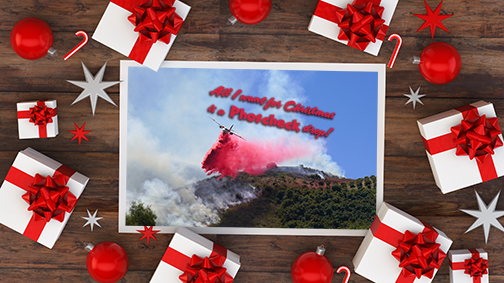
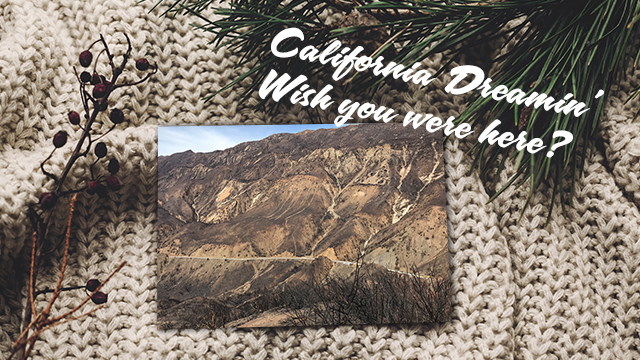
When rain finally came in January, she ran out into it dancing, throwing flower seeds. The rain continued into February when it tore through the ravaged the fire zone, picking up speed on the hardened ground, picking up homes and people who had survived the fire, sweeping the away with mud and logs and pieces of homes into the ocean, some never seen again.

The wildflowers came up in April, the promise of the solstice kept, and it was beautiful. The foxes she had thought were dead, came back and had babies. In June the fire was finally, officially out. But nothing was ever quite the same again because after that she always wondered how long the world she knew would be here.
~ Night One ~

The Waltz of the Snowflakes
by Kaia Merrell
A reminder for the unmoored that the magic is real. KLM
Christmas Eve and Topher Fernsby was leaning against the fly rail of the Royal Theatre watching the dancers stretch before their final performance of The Nutcracker.
He had always loved ballet, but this one was his favorite. Since he was a child he had fallen in love with the idea of a magical kingdom where snowflakes flitted upon their toes and flowers whirled about. A world of Marzipan Shepherdesses and sweets come to life, where fear and hatred did not exist, all accompanied by Tchaikovsky’s beloved score. Although it was different from the fly rail; the ballerinas’ tutus forming new patterns from above, the music was just as he remembered it delicate and sweet as spun sugar.
His favorite movement was “The Waltz of the Snowflakes.” The dancers’ arms, which had been powdered white, quivered like branches in the wind. On their heads sat sparkling diadems which shone like newly fallen snow in the sunlight. And as fake snow fell onstage, a choir sang. It was here that the Nutcracker took Clara’s hand, leading her to that kingdom of light and wonder. Topher thought that if magic existed it would be like this: warm and inviting, suffused with love.
Tonight an air of anticipation filled the theater. The ballet company was leaving for the next leg of their tour which meant everything needed to be packed away after the performance. Topher had agreed to work overtime since he had no family parties or obligations to attend, and it would allow him to say goodbye.
When the dancers left the theater for the last time they did so like a flock of migratory birds adorned in bright colors, their loud foreign voices calling out good cheer to one another. But Topher could not yet mourn their departure. There was work to be done.
The theater swelled under a different music. It was the symphony of men talking merrily as they untied rigging and carried crates to the wagons outside. Topher kept mostly to himself, taking his time with his assignments as if that could prolong the company’s departure. He wished that he might pack himself into a trunk and follow the ballet as an uninitiated acolyte, but of course he did not. Instead he listened to the other men describing the meals their wives were preparing for Christmas day or what bar they would go to with their bonuses. It was cheerful but empty chatter. Topher felt like the only things which mattered were those he was putting in crates.
Once everything was gone, the other men included, Topher walked around the theater dimming the gas lights to relieve the pressure on the valves. The place took on an otherworldly quality. The hard edges of the architecture had softened. The shadows stretched languidly like cats unfurling from their winter’s nap. It was quieter. Some might have said lonely, but Topher liked it. It felt as if the whole theater was in mourning.
He was crossing the stage when something caught his eye. A nutcracker sat in a forgotten corner. Topher went and picked it up. The polished wood was silk under his hands. Tucking it in the crook of his arm, he hurried to the stage door hoping that a wagon might still be there, but of course they had all departed.
He stood in the alleyway, snow falling on his head, and he looked at the Nutcracker once more. It looked alive in the soft pearly light.
Topher knew he ought to send the Nutcracker on with the company, but in this moment he couldn’t help but covet it. There was the temptation to tuck it under his coat and leave. No one would know. It would be another lost item in the chaos of a traveling dance troupe. But that would be stealing the heart of the story. For who would rescue Clara from the Mouse King if not for her Nutcracker Prince? He closed his eyes, needing to think. No matter how much he wished for it to be his, he knew he couldn’t separate the Nutcracker from where it belonged. He knew what it was to be unmoored and he would not wish that on anyone, not even this Nutcracker. Distantly church bells rang, signaling Christmas day at last.
He opened his eyes to go back inside only to find the alley had transformed. He stood in the midst of a dense pine forest. The fragrant aroma which tickled his nose told him it was not an illusion. Snow fell heavily, covering everything. Had the sky been brighter it would have been dazzling.
When he looked back down he saw the Nutcracker was no longer under his arm. Instead a beautiful young man stood before him. Snow was caught in his dark lashes. His cheeks and lips were rosy in the cold, his breath forming little clouds in the air. Even without the red coat with its gold trim and brass buttons winking in the dim light, Topher would have recognized the young man as his Nutcracker.
The Prince held his hand out, a questioning smile curving across his lips. Topher stepped forward through the thick snow and took it. Warmth tingled in his fingers as the Prince intertwined his own with Topher’s. A feeling of contentedness settled in his chest, the aching desire to belong began to be soothed. They walked side by side through the thick pine trees toward a light which shone ahead of them. The snow continued to fall filling in their tracks, and Topher thought if he strained his ears he could hear singing.